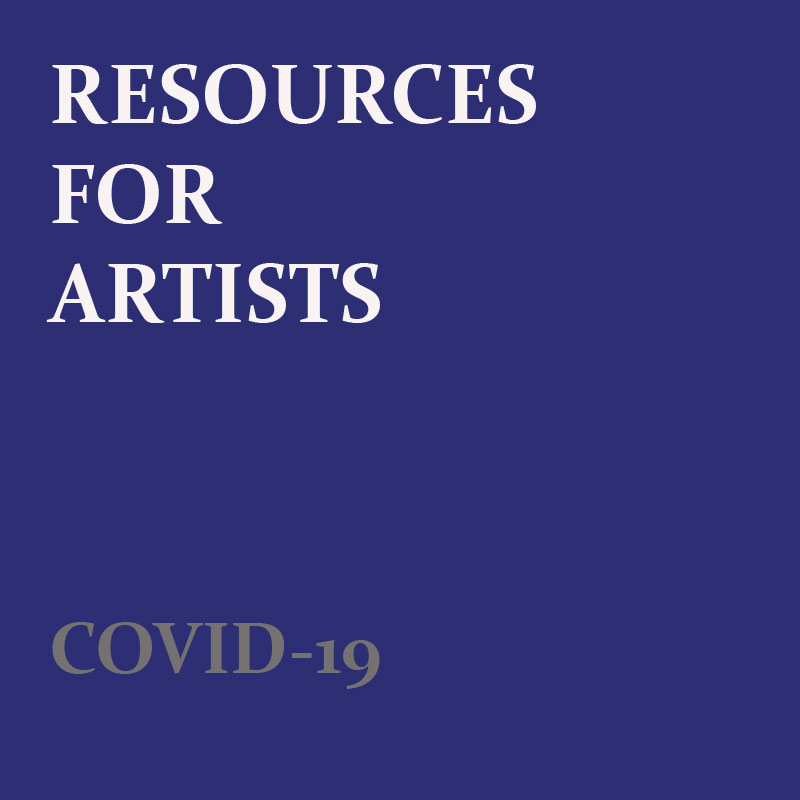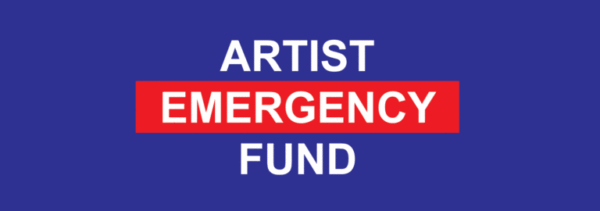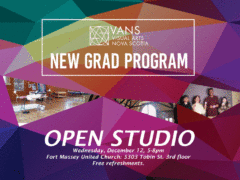
Cancellations, Closures, and Resources – COVID-19
Visual Arts Nova Scotia is taking appropriate precautions during the Coronavirus outbreak. Staff will be working remotely, and the office will be closed to the public until further notice. We have many programs and services that are still accessible online and we will be active on our social media sharing opportunities as usual. Please don’t hesitate to contact us by email with any questions or concerns:
Benny Welter-Nolan, Executive Director: director@visualarts.ns.ca
Carri MacKay, Programming Coordinator: communicate@visualarts.ns.ca
Andrea Ritchie, PAINTS Coordinator: paints@visualarts.ns.ca
RESOURCES FOR ARTISTS:
We will try to keep an updated list of resources that may be helpful to artists in this stressful time.
Notices from the Province of Nova Scotia:
https://novascotia.ca/coronavirus/resources/
- Regular Updates: https://novascotia.ca/coronavirus/alerts-notices/
- Arts, Events and Culture Reopening Guidelines: https://novascotia.ca/coronavirus/docs/CCH-COVID-19-Stakeholder-Guidance-Document.pdf
- Museum and Gallery Reopening Guidelines: https://novascotia.ca/coronavirus/docs/CCH-Museums-Operating-NS.pdf
- Events and Venues Guidelines: https://novascotia.ca/coronavirus/docs/Events-theatres-and-venues-COVID-19-prevention-guidelines.pdf
- Day Camp Guidelines: https://novascotia.ca/coronavirus/docs/COVID-19-Return-to-Day-Camp-Guidelines.pdf
Health Resources
- Nova Scotia Health Authority has information about prevention, testing centres, and more on their website: https://novascotia.ca/coronavirus/
- Health Canada updates, information on symptoms, prevention and risks, and more: https://www.canada.ca/en/public-health/services/diseases/coronavirus-disease-covid-19.html
- Mental Health: Amy Mackenzie is a Registered Counselling Therapist, Canadian Certified Counsellor and Art Therapist. She has a community-oriented practice at the Veith House in North End Halifax and is offering a sliding scale for counselling services based on gross family income for individuals, couples (or throuples), teens and children. She has five years experience working as a Clinical Therapist at Family Service Association and prior to this worked as a mental health counsellor and art therapist in private practice and developed and facilitated art therapy group programs in several locations. She is a NSCAD graduate, a recreational artist and holds a Master’s Degree in Creative Arts Therapies from Concordia University. She is very interested in the creative process and working with artists to help them achieve their goals and work through possible mental health issues, trauma or family/relationship problems. She uses an Acceptance and Commitment Therapy (ACT) approach in counselling sessions, which focuses on reducing the impact of difficult feelings and unhelpful thoughts on values-driven behaviour, while providing several tools to mindfully accept emotions and notice/diffuse from thoughts that can become obstacles. Art therapy elements are entirely optional. At this time, during the global health emergency, she is offering video call or phone-based counselling sessions. Email: amymackenziecounselling@gmail.com. Phone: (902) 473-9391.
Economic Resources
-
If you have been laid off because of the closures, and can apply for EI here are some tips:
Step 1: Login or Register with CRA My Account. The link: https://www.canada.ca/en/revenue-agency/services/e-services/e-services-individuals/account-individuals.html. This link is both where you register/login from and also shows you how to register if you aren’t already.Step 2: Once you’re on the main My Account page, scroll down till you see My Service Canada Account (see attached Screen Shot 1) and hit Access Now. On the next page, click I Agree.Step 3: On the main page you’ll see a link called View My Records of Employment. Click on this to see any ROE’s submitted by employers.Step 4: The link to apply for EI is here: https://www.canada.ca/en/services/benefits/ei/ei-regular-benefit/apply.htmlRemember: You can still submit your EI application without the ROE (when you get to the ‘best weeks’ portion, you can simply skip it for now and enter the info as soon as you have the ROE). CRA My Account/My Service Canada Account is also where you can check on the status of your ROE application. - Tips for applying for the Canada Emergency Response Benefit: https://www.canada.ca/en/services/benefits/ei/cerb-application.html
1. If you qualify for EI, you can apply for CERB through the Service Canada website (they should have your ROE from your employer). They should be able to process your CERB application faster.2. If you don’t qualify for EI (if you are a freelancer or self-employed) then you can apply for the CERB through My CRA, as they are prepared to process applications that don’t have an ROE from people who don’t typically pay into CPP or EI.3. Remember to create a My CRA account first and set up direct deposit. This will expedite your payments – those who have to wait for a cheque will certainly wait longer.4. You can’t be receiving any income within 14 days of applying or your application can be rejected.5. Remember that the CERB will be taxable income, so try save some for next year’s taxes. You will need to re-apply every four weeks to demonstrate your continuing eligibility in order to keep receiving CERB payments.6. The government is asking people to apply based on the month they were born so as not to overwhelm the system, so Monday: January – March, Tuesday: April – June, Wednesday: July – September, Thursday: October – December, Friday to Sunday: any month. - Guide to Applying for Government Aid (written by a Carleton University professor in plain language): https://drive.google.com/file/d/1lOJn7XS6ETIkbLRodYk681M_2dxkkQsc/view
- Craft Alliance Atlantic and their partners have created spreadsheets where artists and craft persons can document their loss of revenues due to COVID-19: https://craftalliance.ca/covid-19/
- Canada Council for the Arts has information on how their programs will change, including a suspension of travel grants, or what to do if your funding is affected by COVID-19: https://canadacouncil.ca/covid-19-information
- Government of Canada: on March 18 the Prime Minister announced a new set of economic measures to help stabilize the economy during this challenging period. These measures, delivered as part of the Government of Canada’s COVID-19 Economic Response Plan, will provide up to $27 billion in direct support to Canadian workers and businesses: https://www.canada.ca/en/department-finance/news/2020/03/canadas-covid-19-economic-response-plan-support-for-canadians-and-businesses.html
-
CBC article on How to apply for EI and COVID-19 emergency benefits: https://www.cbc.ca/news/canada/apply-emergency-benefits-1.5501977
-
Information for Canadian Heritage grants and contributions recipients related to COVID-19: https://www.canada.ca/en/canadian-heritage/services/funding/information-covid-19.html.
- The Worker Emergency Bridge is a one-time payment of $1,000 for Nova Scotians who are laid off or out of work because of COVID-19 on or after March 16), who don’t qualify for Employment Insurance, and earn between $5,000 and $34,000. If you’re self-employed, you will need the following to apply: your Social Insurance Number (SIN) your CRA business number, if you have one a copy of your 2018 tax return (T1, T2, T4002 or T2125) that shows you earned at least $5,000 and less than $34,000. Apply by calling 1-800-863-6582 to speak with a Canadian Red Cross agent. Agents are available 7 days a week (including holidays), 8am to 8pm. See all the info on the NS government website: https://novascotia.ca/coronavirus/worker-emergency-bridge-fund/
- The NS Government’s COVID-19: Small Business Reopening and Support Grant. The Small Business Reopening and Support Grant provides funding to help some small businesses, non-profits, charities and social enterprises that were ordered to close or greatly reduce operations because of the Public Health Order, or were greatly impacted by social distancing and orders to stay home. https://novascotia.ca/coronavirus/small-business-reopening-support-grant/
ADDITIONAL RESOURCES
- Compilation of resources for Canadian artists, writers and media workers during COVID-19 shutdowns. Includes multiple emergency funds, upcoming scholarships, advocacy for freelancers, online training, mental health resources, and more: https://docs.google.com/document/d/1j5G-290oBGludXRJEV4pS-sdefCX9MWUkwk2WT7K99Y/
- CBC article Here’s where Canadian artists and freelancers can find help during COVID-19 shutdowns: https://www.cbc.ca/arts/here-s-where-canadian-artists-and-freelancers-can-find-help-during-covid-19-shutdowns-1.5503360
- Arts Nova Scotia’s Helpful Resources for Artists Impacted by COVID-19: http://artsns.ca/news/helpful-resources-artists-impacted-covid-19
- Global News interview with Visual Artist Christopher Webb discussing ways we can support artists, and engage inspiring artists, during this challenging time: https://globalnews.ca/video/6700822/visual-arts-abstract-with-christopher-webb-3.
- NSCAD University information for students, staff and faculty: https://nscad.ca/covid-19-information-and-updates/
- Akimbo Gallery Closures & Resources List: https://akimbo.ca/listings/gallery-closures-resources-list/
- Helpful information from ARCA:
Evaluating COVID-19 Impact – Approaches to Quantifying Losses
http://www.arca.art/en/files/
Evaluating COVID-19 Impact – Effective Bookkeeping Practices
http://www.arca.art/en/files/
Tips for Working Remotely – Accounting Processes & Documentation
http://www.arca.art/en/files/
Tips for Working Remotely – Managing Payables
http://www.arca.art/en/files/
- List of available info and resources from Work In Culture:
Social Distancing Festival – Includes listings of Live-Streaming Events (poetry slams, operas, concert etc.) from around the world. Event submissions are being accepted.
Glad Day Emergency Fund for LGBTQ2S Artists, Performers & Tip-Based Workers: Includes a link for donations
GTA Black Community Support Fund – crowdfunding with links to other resources
I Lost My Gig by ArtsPondThings to do
- Online Art Challenges to Help You to Stay Creative and Connected: https://mymodernmet.com/coronavirus-quarantine-art-club/
-
12 Museums That Offer Virtual Tours: https://www.travelandleisure.com/attractions/museums-galleries/museums-with-virtual-tours
-
Learn something new at Skillshare, a free resource with classes on many topics, including art: https://www.skillshare.com/
- A long and entirely subjective list of creative challenges to get you through COVID-19, from CBC: https://www.cbc.ca/arts/a-long-and-entirely-subjective-list-of-creative-challenges-to-get-you-through-covid-19-1.5503687
STAY ENGAGED ONLINE:
We have a lot of programs and services that are available online. If having a project helps you, why not update your artist page! Get started on your next grant application, or check out our workshop series. Or read the latest issue of Visual Arts News. We’ll be posting a new article at visualartsnews.ca this soon!
The Canada Council is asking artists to document their losses during the outbreak. We will be advocating for financial relief for artists who’ve been impacted by these circumstances through our funders and other government aid programs. In the meantime we remind members of our small Artist Emergency Fund for those in acute need due to illness.
VANS established the Artist Emergency Fund (AEF) to assist artists in financial need arising from severe illness, an accident resulting in inability to work or help with studio replacement in case of a disaster, such as fire, where there is no insurance. Artists will be able to apply for short-term assistance, up to $500/month for three months maximum. At this time, the fund is relatively small and specific, so it will not serve all artists’ needs. Please see guidelines below for more information and eligibility requirements. You can donate to the Artist Emergency Fund here.



